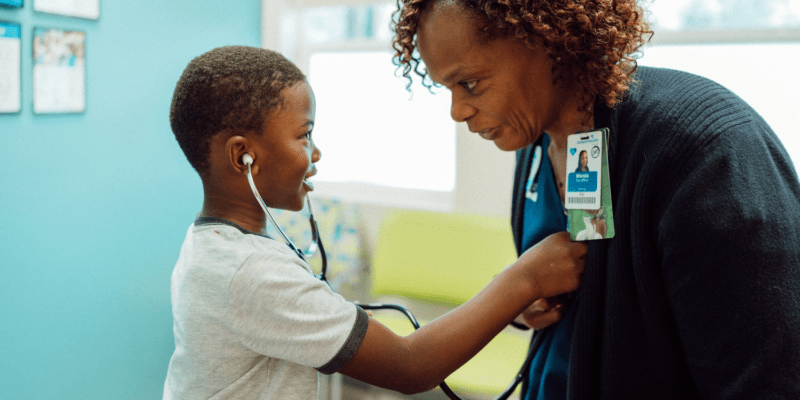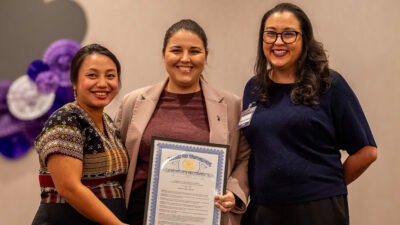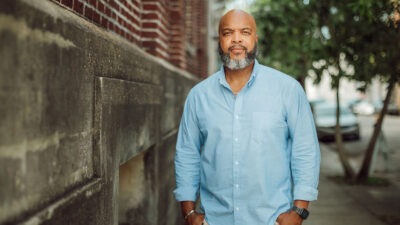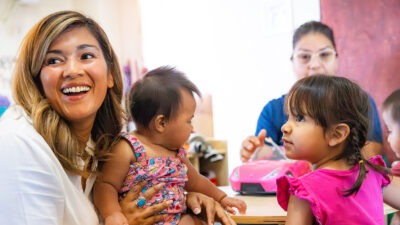This post is also available in: Español (Spanish) Kreyòl (Haitian Creole)
Caroline Brunton is a program officer at the W.K. Kellogg Foundation who leads the national portfolio of work focused on health equity. Her extensive experience in public health, including 13 years at the Centers for Disease Control and Prevention (CDC), provides a broad perspective on how public health and better access to health care help children and families thrive. She sat down with Olivia Chung, communications officer at the Kellogg Foundation, to discuss the importance of public health, the social determinants of health, lessons learned from the COVID-19 pandemic and the critical role of community partnerships in advancing health equity.
Q: What is public health, and why is it crucial for promoting good outcomes for children and families?
A: Public health enables health from a community perspective. It’s not just access to health care; it’s all of the things within a community that allow that community to thrive. This includes ensuring that everybody can be vaccinated, that young children and families have access to food, and that the food and water in a community are safe. All of these pieces together allow people to be healthy, which is obviously so important for kids and families.
A great public health system for kids and families is one that interacts with them systematically. It ensures that if there are concerns or issues that need attention, kids have access to services at the very point where it’s going to help them thrive the most.
Protecting and promoting access to health care coverage, particularly Medicaid, is also crucial for child and family health. Medicaid is the way that more than half of all kids in the United States access health insurance. However, as states are disenrolling people from Medicaid for the first time since the pandemic started, over five million children have lost their coverage to date and thus access to critical health care services. Even brief coverage gaps can cause children to miss important developmental screenings, well-child visits and vaccinations necessary for them to thrive.
Q: What are the social determinants of health, and how do they impact health equity?
A: The social determinants of health is a framework that was developed to demonstrate the impact that factors outside of the health care system have on health. For example, we know that things like education, employment and access to food all have a long-term impact on people’s health. Then there are also underlying social, political and economic factors – like discrimination or socioeconomic status – that can have immediate and long-term impact on people’s health as well.
This framework has broadened our definition of public health beyond just governmental services to include all parts of the community. There’s a lot of data showing that community engagement and civic participation are important determinants of health. Many services in communities are actually provided by community-based organizations. For example, a lot of community organizations went door-to-door during the pandemic to get people information about vaccination eligibility and where vaccines were available in their area. That’s really public health. That real person-to-person connection in the community is a critical part of public health, and it’s really been a shift in our approach to helping children and families achieve and maintain good health.
Q: In the aftermath of the COVID-19 pandemic and its effects on the state of public health, what lessons can be learned?
The COVID-19 pandemic was a stress test of the nation’s public health systems. It highlighted the importance of community-based organizations in reaching populations who may be skeptical of the government. It also exposed the boom-and-bust cycle of public health funding. When there is a health emergency, a lot of money is poured into the system, but there isn’t the same urgency to maintain the infrastructure. This makes it difficult for resources to flow to community-based organizations and ultimately to the communities that need them most.
Despite these challenges, there is reason for hope. The number of people enrolling in public health programs in colleges and universities is increasing, and the next generation of the workforce is demanding change and making their voices heard.
The Kellogg Foundation is working to build capacity in the public health system to advance health equity, partnering with organizations like the Prevention Institute, which is promoting an ecosystem approach to rebuilding public health infrastructure centered on equity and justice. We also work with the Big Cities Health Coalition, which represents the largest cities in the U.S. that are really at the forefront of innovation in public health and in addressing racism and its resulting health inequities as a public health crisis.
Q: What organizations and initiatives are making a difference in advancing health equity, and how is the Kellogg Foundation supporting this work?
A: We work to advance systemic and policy changes that promote health care access and coverage and strengthen the public health infrastructure to advance health equity. We support organizations like the National Health Law Program, which protects and advances the health rights of low-income and underserved individuals and families through advocacy, education and litigation. They have been working tirelessly to mitigate coverage losses during the Medicaid unwind.
We also support the Georgetown Center for Children and Families, which assists state-based partners on their priorities for Medicaid policy. They are currently working with the 11 states that have elected to implement continuous coverage for children ages 0-6, meaning that families will only have to enroll their eligible child for Medicaid once between birth and their entry into school, reducing coverage losses and paperwork burdens.
We are trying to support initiatives that ensure an enabling policy environment for health equity and drive narrative change. It’s really a multi-faceted approach to advancing health equity.
Q: What is the vision for the future of public health, and why are community partnerships essential to achieving health equity?
I think the entire public health sector is grappling with its future following the pandemic. As recognition of the impact of social and environmental factors on the well-being of children, families and communities grows, public health must adapt. Resources need to flow more equitably into communities, and we need to strengthen relationships between public health, other sectors and communities to truly reflect the priorities and needs of those communities.
Community partnerships are essential to achieving health equity because they rebuild trust and re-engage people in the public health system. Community-based organizations can provide feedback to public health agencies to ensure that they are serving the needs of their communities. They also play a critical role in advocating for the communities and families they represent.
The most important thing we can do for the future of public health is to ensure that it really centers those who need it the most. We need to put the public back in public health, and community partnerships are the key to making that happen. This involves protecting and promoting access to health care coverage, building capacity in the public health system, ensuring an enabling policy environment and seeding narrative change. By working together across sectors and in partnership with communities, we can create a future where every child and family has the opportunity to thrive.







Comments